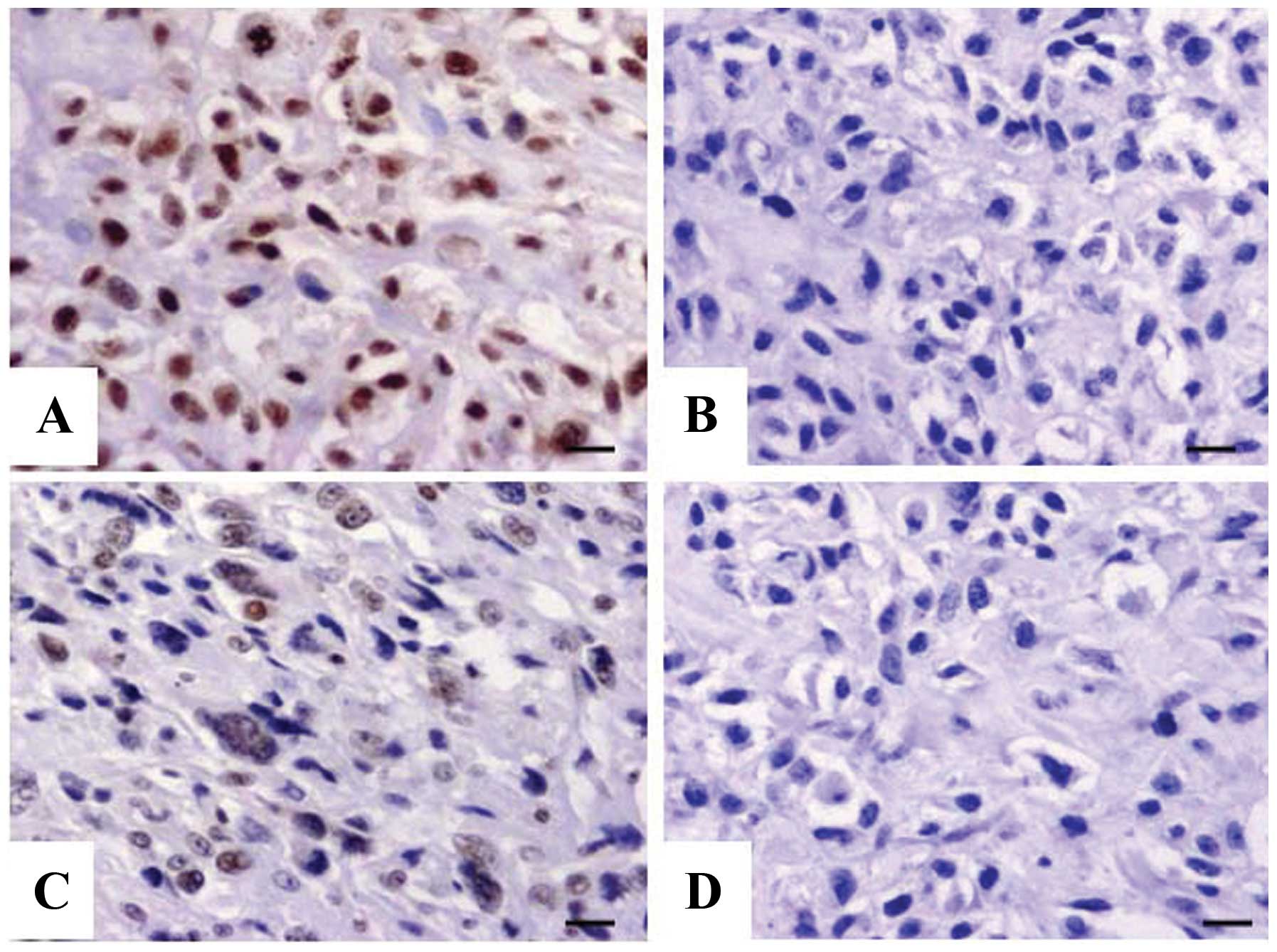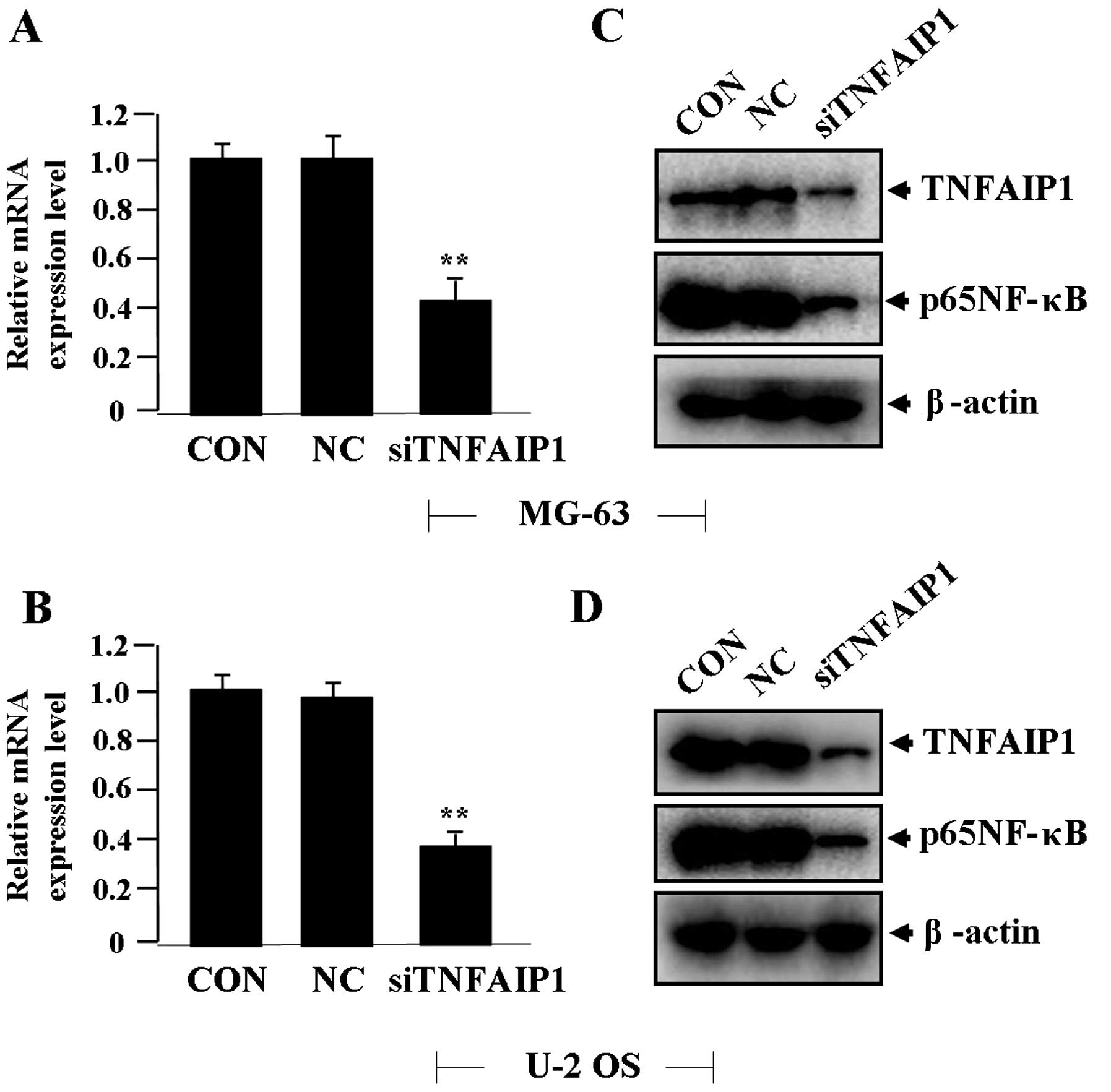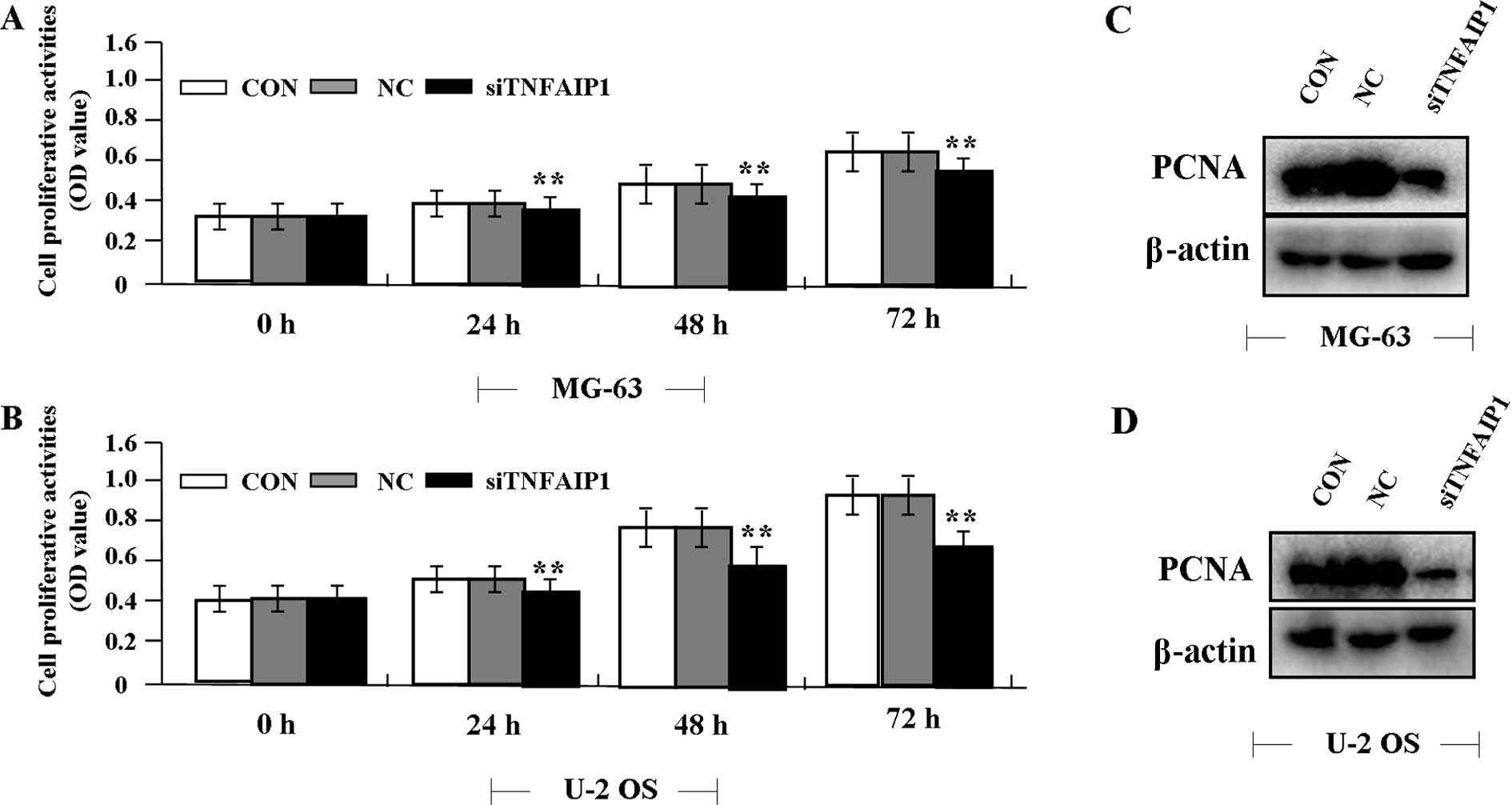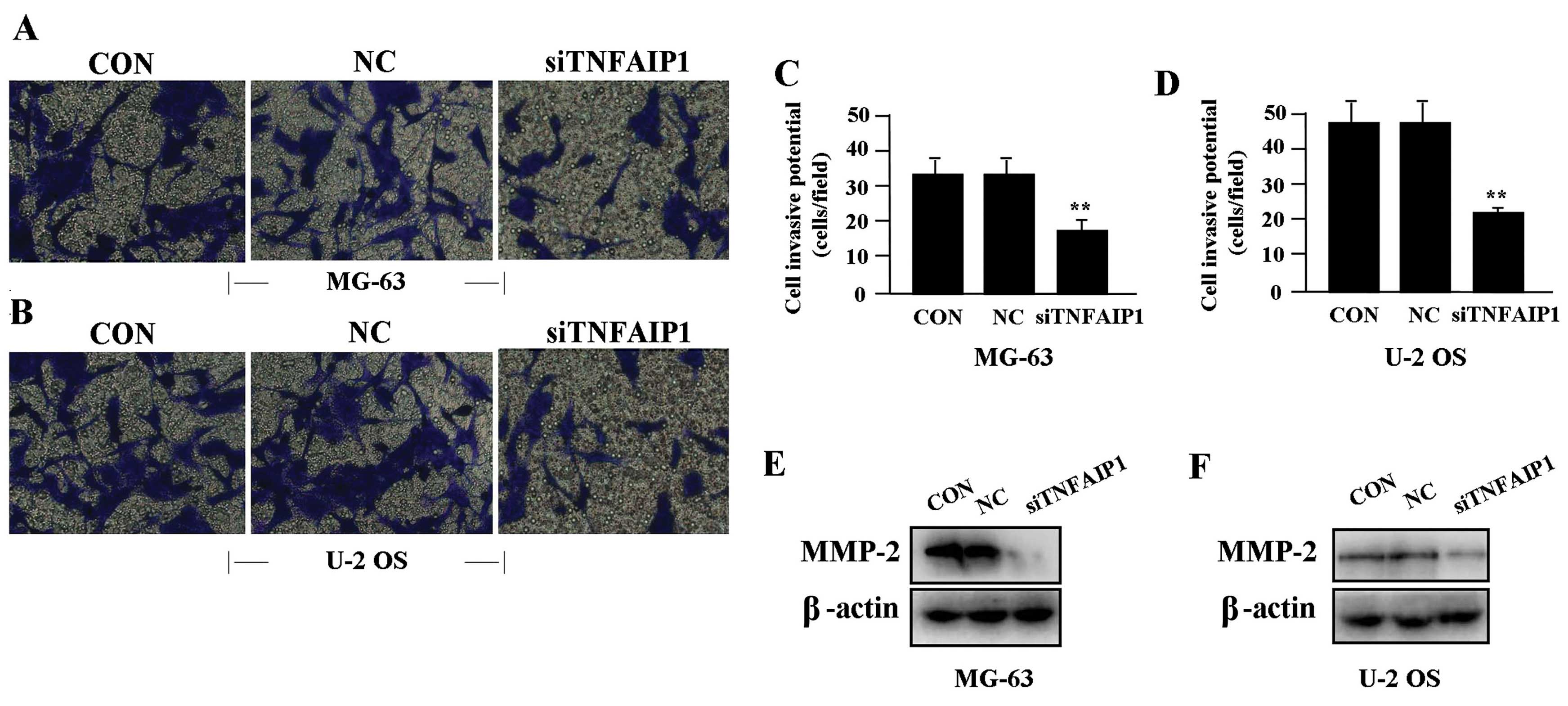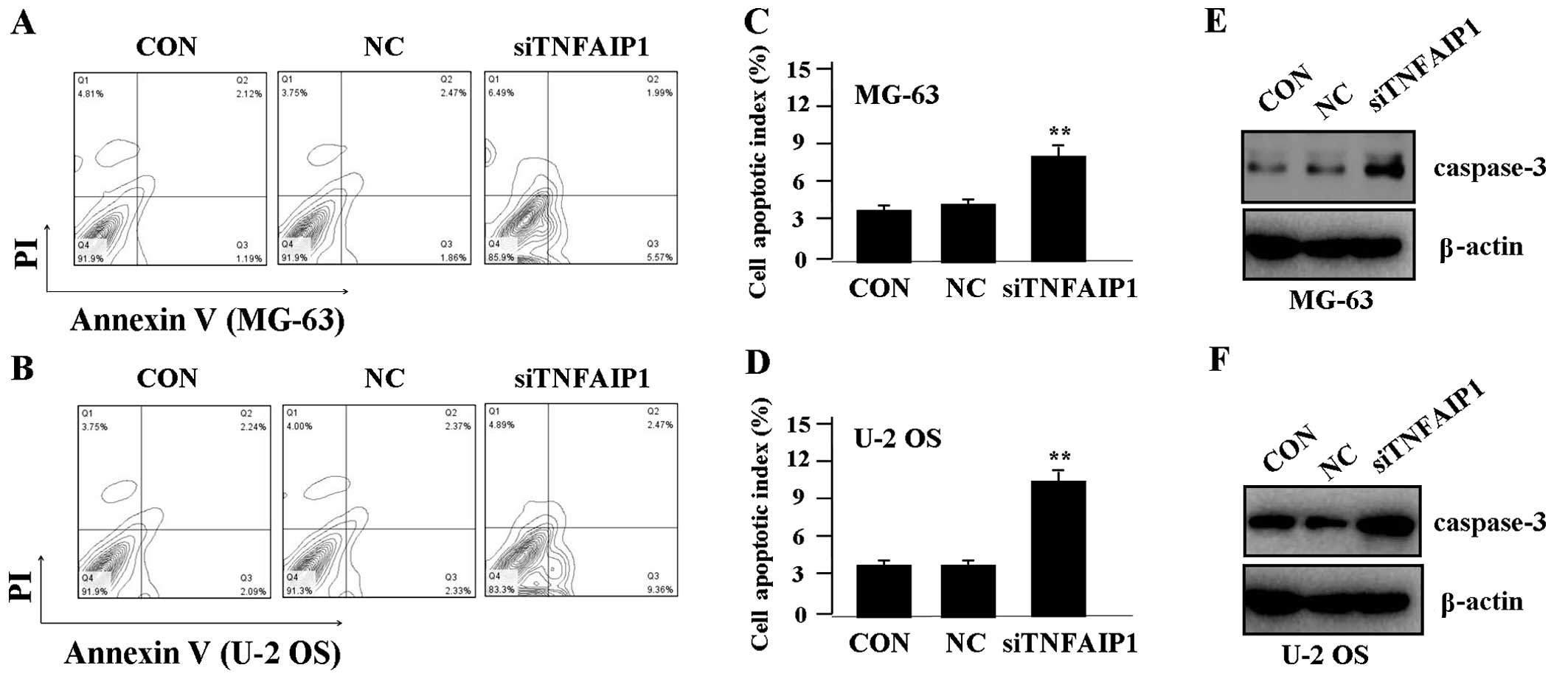|
1
|
Kuijjer ML, van den Akker BE, Hilhorst R,
et al: Kinome and mRNA expression profiling of high-grade
osteosarcoma cell lines implies Akt signaling as possible target
for therapy. BMC Med Gen. 7:42014. View Article : Google Scholar : PubMed/NCBI
|
|
2
|
Buddingh EP, Anninga JK, Versteegh MI, et
al: Prognostic factors in pulmonary metastasized high-grade
osteosarcoma. Pediatr Blood Cancer. 54:216–221. 2010.PubMed/NCBI
|
|
3
|
Bacci G, Longhi A, Versari M, et al:
Prognostic factors for osteosarcoma of the extremity treated with
neoadjuvant chemotherapy: 15-year experience in 789 patients
treated at a single institution. Cancer. 106:1154–1161.
2006.PubMed/NCBI
|
|
4
|
Savage SA, Mirabello L, Wang Z, et al:
Genome-wide association study identifies two susceptibility loci
for osteosarcoma. Nat Genet. 45:799–803. 2013. View Article : Google Scholar : PubMed/NCBI
|
|
5
|
Yang L, Liu N, Hu X, et al: CK2
phosphorylates TNFAIP1 to affect its subcellular localization and
interaction with PCNA. Mol Biol Rep. 37:2967–2973. 2010. View Article : Google Scholar : PubMed/NCBI
|
|
6
|
Link CD, Taft A, Kapulkin V, et al: Gene
expression analysis in a transgenic Caenorhabditis elegans
Alzheimer’s disease model. Neurobiol Aging. 24:397–413. 2003.
View Article : Google Scholar : PubMed/NCBI
|
|
7
|
Lin MC, Lee NP, Zheng N, et al: Tumor
necrosis factor-α-induced protein 1 and immunity to hepatitis B
virus. World J Gastroenterol. 11:7564–7568. 2005.
|
|
8
|
Gupta J, Gaikwad AB and Tikoo K: Hepatic
expression profiling shows involvement of PKC epsilon, DGK eta,
Tnfalpha, and Rho kinase in type 2 diabetic nephropathy rats. J
Cell Biochem. 111:944–954. 2010. View Article : Google Scholar : PubMed/NCBI
|
|
9
|
Grinchuk OV, Motakis E and Kuznetsov VA:
Complex sense-antisense architecture of TNFAIP1/POLDIP2 on 17q11.2
represents a novel transcriptional structural-functional gene
module involved in breast cancer progression. BMC Genomics.
11(Suppl 1): S92010. View Article : Google Scholar
|
|
10
|
Kondratiev S, Duraisamy S, Unitt CL, et
al: Aberrant expression of the dendritic cell marker TNFAIP2 by the
malignant cells of Hodgkin lymphoma and primary mediastinal large
B-cell lymphoma distinguishes these tumor types from
morphologically and phenotypically similar lymphomas. Am J Surg
Pathol. 35:1531–1539. 2011. View Article : Google Scholar
|
|
11
|
Dumon K, Rossbach C, Harms B, et al: Tumor
necrosis factor-alpha (TNF-alpha) gene polymorphism in surgical
intensive care patients with SIRS. Langenbecks Arch Chir Suppl
Kongressbd. 115(Suppl I): 387–390. 1998.(In German).
|
|
12
|
Liu XW, Lu FG, Zhang GS, et al: Proteomics
to display tissue repair opposing injury response to LPS-induced
liver injury. World J Gastroenterol. 10:2701–2705. 2004.PubMed/NCBI
|
|
13
|
Sparks AB, Peterson SN, Bell C, et al:
Mutation screening of the TNFRSF11A gene encoding receptor
activator of NFκB (RANK) in familial and sporadic Paget’s disease
of bone and osteosarcoma. Calcif Tissue Int. 68:151–155. 2001.
|
|
14
|
Javelaud D and Besançon F: NF-κB
activation results in rapid inactivation of JNK in TNFα-treated
Ewing sarcoma cells: a mechanism for the anti-apoptotic effect of
NF-κB. Oncogene. 20:4365–4372. 2001.
|
|
15
|
Chen LC, Chen CC, Liang Y, et al: A novel
role for TNFAIP2: its correlation with invasion and metastasis in
nasopharyngeal carcinoma. Mod Pathol. 24:175–184. 2011. View Article : Google Scholar : PubMed/NCBI
|
|
16
|
Xu Y, Ma H, Yu H, et al: The miR-184
binding-site rs8126 T>C polymorphism in TNFAIP2 is
associated with risk of gastric cancer. PLoS One.
8:e649732013.PubMed/NCBI
|
|
17
|
Zhu Y, Yao Z, Wu Z, et al: Role of tumor
necrosis factor alpha-induced protein 1 in paclitaxel resistance.
Oncogene. Aug 5–2013.(Epub ahead of print). View Article : Google Scholar
|
|
18
|
Zhou C, Li X, Zhang X, et al: microRNA-372
maintains oncogene characteristics by targeting TNFAIP1 and affects
NFκB signaling in human gastric carcinoma cells. Int J Oncol.
42:635–642. 2013.PubMed/NCBI
|
|
19
|
Zhang X, Li X, Tan Z, et al: MicroRNA-373
is upregulated and targets TNFAIP1 in human gastric cancer,
contributing to tumorigenesis. Oncol Lett. 6:1427–1434.
2013.PubMed/NCBI
|
|
20
|
Chen CC, Liu HP, Chao M, et al:
NF-κB-mediated transcriptional upregulation of TNFAIP2 by the
Epstein-Barr virus oncoprotein, LMP1, promotes cell motility in
nasopharyngeal carcinoma. Oncogene. Aug 26–2013.(Epub ahead of
print). View Article : Google Scholar
|
|
21
|
Cheng YH, Utsunomiya H, Pavone ME, et al:
Retinoic acid inhibits endometrial cancer cell growth via multiple
genomic mechanisms. J Mol Endocrinol. 46:139–153. 2011. View Article : Google Scholar : PubMed/NCBI
|
|
22
|
Rusiniak ME, Yu M, Ross DT, et al:
Identification of B94 (TNFAIP2) as a potential retinoic acid target
gene in acute promyelocytic leukemia. Cancer Res. 60:1824–1829.
2000.PubMed/NCBI
|
|
23
|
Kim DM, Chung KS, Choi SJ, et al: RhoB
induces apoptosis via direct interaction with TNFAIP1 in
HeLa cells. Int J Cancer. 125:2520–2527. 2009.PubMed/NCBI
|
|
24
|
Javelaud D, Poupon MF, Wietzerbin and
Besançon F: Inhibition of constitutive NF-κB activity suppresses
tumorigenicity of Ewing sarcoma EW7 cells. Int J Cancer.
98:193–198. 2002.
|
|
25
|
Hu X, Yan F, Wang F, et al: TNFAIP1
interacts with KCTD10 to promote the degradation of KCTD10 proteins
and inhibit the transcriptional activities of NF-κB and AP-1. Mol
Biol Rep. 39:9911–9919. 2012.PubMed/NCBI
|
|
26
|
Risio M: Cell proliferation in colorectal
tumor progression: an immunohistochemical approach to intermediate
biomarkers. J Cell Biochem (Suppl). 16G:79–87. 1992. View Article : Google Scholar : PubMed/NCBI
|
|
27
|
Hornebeck W, Lambert E, Petitfrère E and
Bernard P: Beneficial and detrimental influences of tissue
inhibitor of metalloproteinase-1 (TIMP-1) in tumor progression.
Biochimie. 87:377–383. 2005. View Article : Google Scholar : PubMed/NCBI
|
|
28
|
Shah SJ and Sylvester PW: γ-Tocotrienol
inhibits neoplastic mammary epithelial cell proliferation by
decreasing Akt and nuclear factor κB activity. Exp Biol Med.
230:235–241. 2005.
|
|
29
|
Philip S, Bulbule A and Kundu GC:
Osteopontin stimulates tumor growth and activation of promatrix
metalloproteinase-2 through nuclear factor-κB-mediated induction of
membrane type 1 matrix metalloproteinase in murine melanoma cells.
J Biol Chem. 276:44926–44935. 2001.
|
|
30
|
Moalic-Juge S, Liagre B, Duval R, et al:
The anti-apoptotic property of NS-398 at high dose can be mediated
in part through NF-κB activation, hsp70 induction and a decrease in
caspase-3 activity in human osteosarcoma cells. Int J Oncol.
20:1255–1262. 2002.PubMed/NCBI
|
|
31
|
Zhou J, Hu X, Xiong X, et al: Cloning of
two rat PDIP1 related genes and their interactions with
proliferating cell nuclear antigen. J Exp Zool A Comp Exp Biol.
303:227–240. 2005. View Article : Google Scholar : PubMed/NCBI
|















